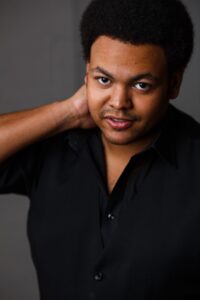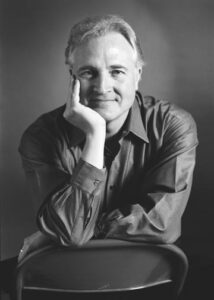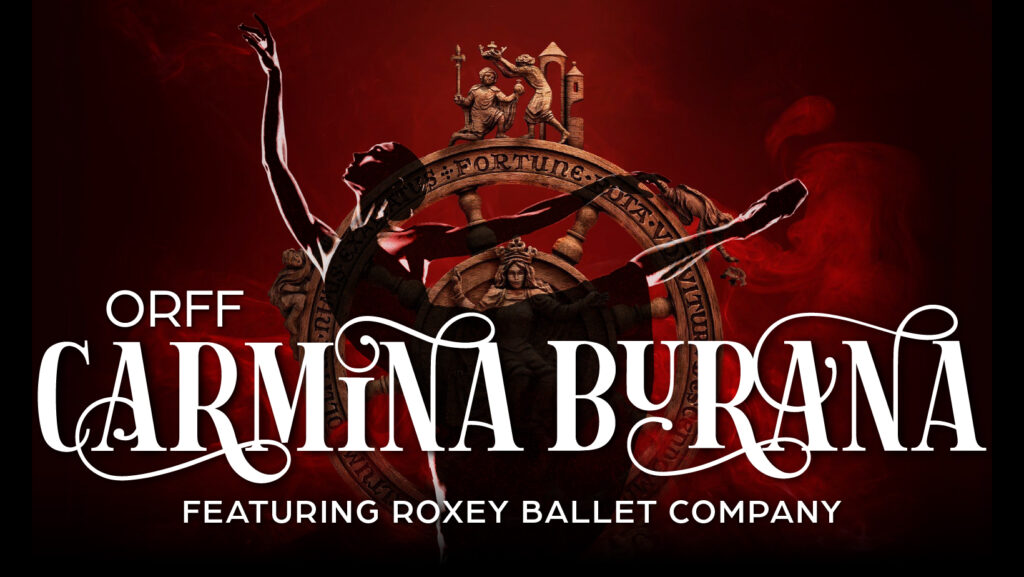Sanctuary Road
Sanctuary Road
Laquita Mitchell, soprano
Krysty Swann, mezzo-soprano
Joshua Blue, tenor
Malcolm J. Merriweather, baritone
Joseph Parrish, bass-baritone
May 5, 2024
4:00 p.m.
Richardson Auditorium
Princeton University
Sanctuary Road
Laquita Mitchell, soprano
Krysty Swann, mezzo-soprano
Joshua Blue, tenor
Malcolm J. Merriweather, baritone
Joseph Parrish, bass-baritone
May 5, 2024
4:00 p.m.
Richardson Auditorium
Princeton University
Over a dozen or so seasons, we’ve enjoyed many large-scale choral-orchestral works together. Some have been settings of sacred, liturgical texts — masses, requiems, and the like. Others —oratorios like Handel’s Solomon, Bach’s St. John Passion, and Mendelssohn’s Elijah — had dramatic librettos drawn from the bible. A few years ago, we experienced James Whitbourn’s Annelies: the Diary of Anne Frank which set to music that well-known document. Today’s offering, Paul Moravec and Mark Campbell’s Sanctuary Road, draws from an American historical document, William Still’s The Underground Railroad Records. Just as Whitbourn’s Annelies vivified, through music, Anne Frank’s diary entries, relaying portions of Anne’s particular story while reflecting a broader story about the plight of Jews in World War II, Sanctuary Road brings to life specific accounts in Still’s book while drawing us into the broader story of American history in the 1850s and 60s.
William Still was an abolitionist and a prolific and important figure in the Underground Railroad, a collaborative historical phenomenon comprising countless heroic acts of bravery and sacrifice ignited by the burning desire for freedom in the face of the horrors of slavery. As part of the Compromise of 1850, congress passed the Fugitive Slave Act of 1850, to reinforce the then weakened original Fugitive Slave Act of 1793. The new law outlined penalties for officials who did not arrest someone allegedly escaping from slavery, including immense fines, as well as perverse incentives: a Commissioner determining whether or not someone was a fugitive (no jury was permitted) made $10 if he proved the person a fugitive but only $5 if the proof was insufficient. Enslavers needed nothing further than to supply an affidavit to a Federal marshal to recapture a fugitive. Moreover, the law outlined a fine and imprisonment of up to six months for someone found to be aiding a fugitive by providing food or shelter.
Nevertheless, in the face of these dangers, William Still, during the 1850s, helped enslaved people escape to freedom through his station in Philadelphia (perhaps more than 640 in his lifetime). He also kept meticulous records, preserving aspects of the enslaveds' stories we might not otherwise have—names, aliases, biographies, destinations, owners. He also collected newspaper notices, letters, and legal documents. In 1872, he published his records. Librettist Mark Campbell drew from Still’s Records the stories of several individuals making their way to Still in Philadelphia, eventually on their way to Canada (one outcome of the Fugitive Slave Act of 1850 was that many enslaved people fleeing chose to head beyond the United States altogether). By marshaling dozens of artists to deliver Still’s words via Paul Moravec’s sumptuous, stirring, and intense music, Sanctuary Road lets us feel, on the human level, the dimensions of the historical figures in the story as they shout, whisper, run, hide, fear, and hope.
In 2018, I had the opportunity to hear the premiere of Sanctuary Road, an oratorio based on the writings of William Still, a conductor of the Underground Railroad, by American composer Paul Moravec and librettist Mark Campbell, in Carnegie Hall, given by my friends at the Oratorio Society of New York, under the baton of Kent Tritle, featuring an outstanding team of soloists (three of whom you’ll hear today). I was struck, then, as I am now, by the way the humanity of the work is apparent in its first few seconds. “Sarah Grace, Clarissa Davis, Wesley Harris:” These are the names of real people. As it proceeds, William Still recites the introduction of his book and then intones a series of imperatives: “Write it down. Record. Recount. Chronicle.” Still ushers in the final section, “their testimony will never be forgotten,” which chorus and soloists repeat. The movement concludes with Still’s voice alone, rededicating himself to his endeavor. Still speaks to himself, to be sure, but also, perhaps, to posterity, clarifying the purpose of just such an oratorio.
The second and third movements juxtapose the humanity of the escaping slaves with the inhumane disregard of those who wish to capture them. The second, “Quietly,” centers the potency of the concept of freedom. Its text reads: “One little word, one sweet little word. Free. To raise your own family. Free to have your own life. Free to be your own person, your own soul. May not be tomorrow. May take us a while. Imagine it. Pray for it. Find a way. Make it come to be. Quietly, quietly. Free.” In stark contrast to the humanity of the soloists’ hushed hopefulness of the enslaved in “Quietly'' stands the brazen indifference to it conveyed in the chorus’s reading out texts from reward posters: not qualities, identities, people, but physical attributes, generic descriptions, and bounties.
The stakes thus established, the inner movements of the oratorio comprise a series of vignettes–individual accounts of escape that display the tenacity, ingenuity, and bravery of the men and women whose true stories were recorded by William Still. First is Ellen Craft, who escaped by powdering her face and dressing up as an old, wounded white man on his way to Philadelphia to see a doctor, who’s accompanied on the train by a black man, posing as his valet, who is, in fact, her betrothed. On the train, her master’s brother, whom she served dinner the previous evening, sits across from her, unaware of her true identity. The story captures the almost impossible emotional mix of utter fear, burning hope, and love. Moravec, a seasoned composer of opera, crafts a vocal line both urgent and soaring, brilliantly uses the orchestra to convey Ellen Craft’s agita and the tenseness of the train ride. The fifth movement, sparse, direct, portrays one of Still’s interviews. It’s here that we first hear of the “lion’s paw”--the lion on the Canadian flag, “standing tall, proud, and defiant.” The sixth is the first of three movements titled “run,” depicting an slaved man on the run named Wesley Harris. The tenor’s toggling between short gasping phrases and long, high-note outbursts, amidst scampering staccatos and jagged offbeats in the orchestra portrays Harris’s urgency and determination.
The seventh movement “This Side Up,” shares the extraordinary story of Henry “Box” Brown, who stuffed himself into a tiny shipping crate and mailed himself to Philadelphia. Brown spent more than a day upside down (in spite of a THIS SIDE UP stamp), completely still, breathing through a tiny hole. He sings, “my brain may burst from being upside down and my eyeballs may explode. But it’s worth every second of those twenty-six hours, even if I’m caught, even if I’m beaten, even if they hang me from a tree. For just the slightest chance, the dimmest hope, that this crate I mailed myself in, arrives safe and sound in Philadelphia. Now if only those fools could read.” Upon arrival, Mr. Brown, unboxed, recited words from Psalm 40 to the abolitionists gathered, including William Still. Here the chorus shares them, continuing and commenting upon Brown’s story: “I waited patiently for the Lord, and He inclined unto me, and heard my calling.” The continuation of Wesley Harris’s escape–a second “Run” movement–shatters the reverent atmosphere of the choral psalm. Another interview follows. The eleventh movement, a duet, features two women on a train, in mourning veils and black dresses, on their way to the funeral of a fictional “Aunt Abigail.” In the subsequent interview movement, William Still discovers that his interviewee is, in fact, his much older brother, Peter. In a moment of profound tenderness, they confirm this by singing, together, the song their mother sang to each of them when they were young. Wiliam will bring their mother, still alive, to see Peter, who has been praying for their reunion for 42 years. The third of the “Run” movements follows, now with the chorus interjecting, as Harris’s inner voice of determination.
Before the work moves into its final chapter, Moravec and Cambpell pause on a risky but sustaining emotion—the imagined joy of future freedom. The soprano soloist bids the rain: “double the darkness of this night, that I might slip away like a shadow and get to the boat that will take me up north to liberty, to my own life. Come down rain, come down hard. Come down fast. Come down Noah’s Ark heavy. And when I’m free, I’ll dance in that rain that hid me, that saved me, that delivered me to freedom. Following the heaving breathing and quicksilver feet of the “Run” movements, the languid lilt of this movement conjures a moment, not in real time but in one’s heart. We then hear Still decide to stow away his documents during the Civil War, which is depicted wordlessly by chorus and orchestra.
The finale begins with Still’s recovering his documents after the end of the War, intact. He treasures the letters sent to him from Canada, from those who had made it securely to their freedom there. Moravec’s sweeping music buoys the soloists’ sense of gratitude and deliverance. When, at the oratorio’s conclusion, all of the gathered forces, mustering maximum power, deliver its final words–”Shout from ev’ry rooftop, loud as can be, joyfully, finally come true, one sweet little word: free”--the sensation is overwhelming. The word fearfully but fiercely whispered in the second movement erupts in full-throated rapture. The conclusion heralds the freedom achieved by the individuals we’ve met along the way and echoes the freedom of emancipation.
But at the same time, those repeated outcries resound beyond the double barline and remind us that while Still shepherded hundreds to freedom, and the oratorio concludes triumphantly, freedom itself is far from a fait accompli. Emancipation may have ended the institution of slavery, but inequity has been institutionalized in insidious ways from the Proclamation to the present day. William Still sings “their testimony will never be forgotten,” yet the threat of erasure looms in local legislatures and libraries they seek to police. History is constructed by those empowered to write it. The famous words commencing the Declaration of Independence, “We hold these truths to be self-evident, that all men are created equal,” were written by a man who, as did seven other US presidents, held men and women unequal to him by virtue of his owning them. In 1776, enslaved people comprised about one-fifth of the population of the 13 colonies, but this Declaration wasn’t theirs. How fortunate we are that William Still felt the imperative to write and record his and others’ stories, contributing to the ongoing project of chronicling a fuller American history. We’re reminded that freedom cannot be declared definitively or granted but instead must continually be re-forged in our ongoing commitment to create and preserve it.
As noted before, Sanctuary Road is several things at once. It is, in one sense, a musical telling of the achievements of an extraordinary man and the many people he aided that powerfully lends personhood to individuals from whom it was so brutally and purposefully stripped. It is, at the same time, a bigger story, demonstrating humankind’s capacity, in the face of one of its basest and most deplorable chapters, for incredible bravery, staggering selflessness, and profound love. To take in its testimonies is to engage in history at its best: an ongoing exchange wherein we listen to, and learn from, each other.
Ryan Brandau, 2024
Sanctuary Road
Music by Paul Moravec and Libretto by Mark Campbell
An oratorio based on the writings of William Still, a conductor for the Underground Railroad
1. Write
William Still, Solo Ensemble, Chorus
2. Quietly
Ensemble
3. Reward!
Chorus, Ensemble
4. The Same Train — Ellen Craft
Mezzo-soprano
5. Interview I
William Still, Baritone
6. Run (Part I) — Wesley Harris
Tenor
7. This Side Up — Henry "Box" Brown
Baritone
8. I Waited
William Still, Baritone, Chorus
9. Run (Part 2) — Wesley Harris
Tenor
10. Interview II
William Still, Soprano
11. Aunt Abigail: Harriet Eglan, Charlotte Giles
Soprano and Mezzo-soprano
12. Interview III
William Still, Baritone
13. Run (Part 3) — Wesley Harris
Tenor, Chorus
14. Interview IV
Ensemble
15. Rain — Clarissa Davis
Soprano, Ensemble
16. War
William Still, Ensemble, Chorus
17. Finale
All
Rotate mobile device to landscape (horizontal) orientation for better formatting.

Soprano Laquita Mitchell consistently earns acclaim in eminent opera companies throughout North America and Europe. Already in her young career, she has led performances with the Los Angeles Opera, San Francisco Opera, Houston Grand Opera, Lyric Opera of Chicago, New York City Opera, Washington National Opera, Opéra Comique in Paris, among many others.
Soprano Laquita Mitchell begins the 2023-2024 season at the New Orleans Opera, where she will sing the role of the Countess in Mozart’s masterpiece Le Nozze Di Figaro, in a new production by Chas Rader-Shieber. Ms. Mitchell is pleased to be a part of the 150th Season Anniversary opening night of the Oratorio Society of New York at Carnegie Hall, where she will be the soprano soloist for Bach Magnificat and Mozart Requiem.
A humanitarian at heart, Ms. Mitchell will take part in concerts and master classes in the island of Jamaica, bringing classical music to the University of the West Indies. Ms. Mitchell will begin the new year starring in a newly-staged production of Paul Moravec and Mark Campbell’s Sanctuary Road for the Virginia Opera. She will reprise the soprano role in Sanctuary Road with the Bach Festival Society of Winter Park and Princeton Pro Musica. Ms. Mitchell will debut in the Concert Series at St. Thomas Church in New York City performing the rarely-heard Poulenc: Stabat Mater. She will be the soprano soloist for Beethoven Symphony No. 9 with the Chattanooga Symphony and will finish her season singing the beautiful soprano solo in Mahler Symphony No. 4 with the Waterbury Symphony.
Highlights of Ms. Mitchell’s 2022-2023 season include the soprano solos in Beethoven Symphony No. 9 with the Madison Symphony Orchestra under the baton of John Demain; the role of Josephine Baker in Tom Cipullo’s Josephine for Music of Remembrance in Seattle, Washington; soprano solos for Michael Tippett’s A Child of Our Time with the Duluth Superior Symphony Orchestra; a Christmas Concert for WQXR at the Greene Space; and her debut with the Sarasota Symphony Orchestra singing the soprano solo in Mahler Symphony No. 4. Mitchell made her return to the role of Julie, which she originated, in the Pulitzer Prize winning opera Omar written by Rhiannon Giddens and Micheal Abels at the Carolina Performing Arts Center. Ms. Mitchell sang the soprano solo in Paul Moravec’s Sanctuary Road with the Vocal Arts Ensemble of Cincinnati. The late conductor Bramwell Tovey programmed the Verdi Requiem with the Rhode Island Philharmonic before his death in the 2022-2023 season, Ms. Mitchell was humbled to sing the soprano solo in Requiem as the piece was dedicated to Tovey’s memory. Mitchell returned to Cincinnati to make her debut with the Cincinnati May Festival, singing Nathaniel Dett’s The Ordering of Moses under the baton of Marin Alsop. Mitchell jumped in for an indisposed colleague, singing the soprano solo in Verdi Requiem, making her debut with the Buffalo Philharmonic under the baton of JoAnn Falletta. Ms. Mitchell finished her season singing Samuel Barber’s American classic Knoxville: Summer of 1915 with the Detroit Symphony Orchestra.
Laquita Mitchell is a Metropolitan Opera National Council Auditions Grand Prize Winner, and was awarded a 2004 Sara Tucker Award. She was also the First Prize Winner of the Wiener Kammer Oper’s 2003 Hans Gabor Belvedere Competition, and the First Prize Winner of the Houston Grand Opera Eleanor McCollum Competition for Young Singers, as well as the winner of the Audience Choice award. Ms. Mitchell is an alumna of the San Francisco Opera’s Merola Program and the Houston Grand Opera Studio. She completed her Master’s and the Professional Studies Certificate at the Manhattan School of Music, and completed her Bachelor’s in Music Education at Westminster Choir College. Ms. Mitchell is the recipient of the 2010 Distinguished Young Alumni Award from her alma mater the Manhattan School of Music. In May of 2015 Ms. Mitchell received the Distinguished Alumni Award from her undergrad, Westminster Choir College. As an educator, Ms. Mitchell has given master classes at major universities and colleges, including Historic Black Colleges and Universities. She understands the challenges that many of these students face and has played a pivotal role in many of the lives of these gifted students as they pursue their graduate work in voice at major colleges and universities. Ms. Mitchell is a vocal instructor at the Conservatory of Music of Brooklyn College CUNY and the newest faculty member at the Mannes College of Music at The New School.
Ms. Mitchell can be seen in the San Francisco Opera's DVD of Gershwin's Porgy and Bess in the role of Bess.
Ms. Mitchell can be heard as the soprano soloist on the Avie Label in Margaret Bonds’ The Ballad of the Brown King with The Dessoff Choirs.
Ms. Mitchell can be heard as the soprano soloist on the Naxos Label in Paul Moravec's Sanctuary Road with the Oratorio Society of New York.
 Acclaimed mezzo-soprano Krysty Swann has been hailed for her beautiful and rich voice, as well as her captivating presence on stage. The Washington Post declared, “Krysty Swann has a voice, and she knows how to use it...[She] displayed an instrument of immense power, natural beauty of tone and luscious legato line.” The Philadelphia-born, New York-based mezzo-soprano also had the pleasure of being featured on the cover of Opera News with the great Dolora Zajick.
Acclaimed mezzo-soprano Krysty Swann has been hailed for her beautiful and rich voice, as well as her captivating presence on stage. The Washington Post declared, “Krysty Swann has a voice, and she knows how to use it...[She] displayed an instrument of immense power, natural beauty of tone and luscious legato line.” The Philadelphia-born, New York-based mezzo-soprano also had the pleasure of being featured on the cover of Opera News with the great Dolora Zajick.
Ms. Swann will open the 2023/24 season as Jade Boucher in Dead Man Walking for The Metropolitan Opera, followed by the Mother in New Orleans Opera’s production of Blue, Cousin Blanche in Champion with Lyric Opera of Chicago, Shönberg’s Gurre-Lieder with the American Symphony Orchestra at Carnegie Hall, and Sanctuary Road with Princeton Pro Musica.
Last season, Swann returned to The Metropolitan Opera as Cousin Blanche in Champion, and sang Rossweisse in Detroit Opera’s The Valkyries, Elijah with Hilton Head Symphony Orchestra, Verdi’s Requiem with the Bach Festival Society of Winter Park, The Ordering of Moses for Oberlin Conservatory, and Handel’s Messiah for Pacific Symphony.
In recent seasons, Ms. Swann débuted at The Metropolitan Opera as the Third Maid in Elektra and appeared in the revival of Philip Glass’ Akhnaten. In addition, Swann saw her first performances as the Mother in Jeanine Tesori and Tazewell Thompson's Blue for Michigan Opera Theatre. For Lincoln Center Theater, she created the role of Mayme in the world premiere of Intimate Apparel, directed by Bartlett Sher and written by Lynn Nottage and Ricky Ian Gordon. On the concert stage, Ms. Swann performed The Ordering of Moses for the Bach Festival Society of Winter Park, and the mezzo-soprano solo in Beethoven’s Symphony No. 9 for the Lubbock Symphony Orchestra. She appeared in a virtual performance of Handel’s Messiah with Glens Falls Symphony, in a Gala Concert for Princeton Festival, and in Tulsa Opera’s Greenwood Overcomes concert. She also created the role of Joyce “Tilly” Mitchell in the world premiere of Nico Muhly’s digital one act opera The Glitch which was released by Catapult Opera in February 2021.
With The Metropolitan Opera, she has appeared in productions of Die Walküre, Marnie, Il tabarro, and Francesca da Rimini. She also appeared in the Lyric Opera of Chicago’s productions of Rigoletto, Die Walküre, and as the Third Maid in Elektra. Other recent engagements include her return to Grimgerde in Dallas Symphony’s concert production of Die Walküre under the baton of Maestro Jaap van Zweden, the role of Grandma in the world premiere of Douglas Tappin’s I Dream with Toledo Opera and Opera Carolina, and Irina in Lost in the Stars with Union Avenue Opera. She also performed in Mary Shelley’s Frankenstein with the Ensemble for the Romantic Century in New York.
She performed Suzuki in Madama Butterfly with New York City Opera, Maddalena in The Atlanta Opera’s Rigoletto, and Amneris in Bucharest National Opera's production of Aida. She also covered the title role of Richard Danielpour's opera Margaret Garner, which received its world premiere in 2005 (New York City Opera).
Concert highlights from recent seasons also include Mozart’s Requiem at Carnegie Hall; Verdi’s Requiem at Lincoln Center and with Santa Barbara Symphony; her concert début in South Africa with the acclaimed KZN Philharmonic Orchestra under the baton of Daniel Boico; her Milan début in concert with La Verdi orchestra; a return to Austria's Bregenz Festival for a second season; and her début with the Boston Symphony Orchestra as well as the Tanglewood Music Festival. Additional concert engagements include Mahler’s Symphony No. 3 with Thailand Philharmonic Orchestra, Mozart’s Great Mass in C Minor with the Eugene Concert Choir, and an MLK tribute concert with Bach Festival Society of Winter Park. Ms. Swann returned to Carnegie Hall as Lola in Cavalleria rusticana with the Opera Orchestra of New York under the baton of Alberto Veronesi, alongside Maria Guleghina, Roberto Alagna, and Mignon Dunn, garnering rave reviews. She has appeared as a soloist in Messiah with the Rochester Symphony Orchestra, Indianapolis Chamber Orchestra, and Baltimore Symphony Orchestra. She has also appeared as Emilia with Nathan Gunn and Victoria Clarke in The Firebrand of Florence by Kurt Weill and Ira Gershwin, conducted by Ted Sperling. She made her début at Avery Fisher Hall in Verdi's Requiem and sang in Giacomo Puccini's Edgar along with Marcello Giordani with the Opera Orchestra of New York conducted by Eve Queler.
Ms. Swann is a winner of the 2013 Marcello Giordani International Vocal Competition in Italy and the Intermezzo Foundation Award (Elardo International Opera Competition), as well as a two-time winner of the Richard F. Gold Career Grant (New York City Opera and Manhattan School of Music). Other distinctions include the Silver Prize of the Opera Index Competition and prizes from the Licia Albanese Puccini Foundation and the Metropolitan Opera National Council Auditions.
 In the 2023-24 season, British-American tenor Joshua Blue makes his Houston Grand Opera stage debut creating the role of Wilson in the world premiere of Jake Heggie's new work Intelligence. He also performs Moravec's Sanctuary Road with the Bach Festival Society of Winter Park and joins the Royal Opera House on tour to Japan covering the Duke in Rigoletto with Antonio Pappano on the podium. Mr. Blue returns to the Metropolitan Opera as Tamino in Julie Taymor's production of The Magic Flute. He will reunite with the American Symphony Orchestra and conductor Leon Botstein to sing Dvořák's Requiem at Carnegie Hall and Brahms' Rinaldo at the Fisher Center at Bard. He has been engaged by the LA Phil, Washington National Opera, Philadelphia Orchestra, National Symphony Orchestra, Orchestra of St. Luke's, and Wolf Trap Opera, collaborating with conductors James Conlon, Gianandrea Noseda, Eun Sun Kim, Fabio Luisi, James Gaffigan, Carlo Rizzi, Bertrand de Billy, Bernard Labadie, and Leonard Slatkin, at venues as far-ranging as the Hollywood Bowl. He is the recipient of The Mabel Dorn Reeder Foundation Prize and James McCracken and Sandra Warfield Opera Prize. Mr. Blue holds degrees from the Oberlin Conservatory of Music and The Juilliard School.
In the 2023-24 season, British-American tenor Joshua Blue makes his Houston Grand Opera stage debut creating the role of Wilson in the world premiere of Jake Heggie's new work Intelligence. He also performs Moravec's Sanctuary Road with the Bach Festival Society of Winter Park and joins the Royal Opera House on tour to Japan covering the Duke in Rigoletto with Antonio Pappano on the podium. Mr. Blue returns to the Metropolitan Opera as Tamino in Julie Taymor's production of The Magic Flute. He will reunite with the American Symphony Orchestra and conductor Leon Botstein to sing Dvořák's Requiem at Carnegie Hall and Brahms' Rinaldo at the Fisher Center at Bard. He has been engaged by the LA Phil, Washington National Opera, Philadelphia Orchestra, National Symphony Orchestra, Orchestra of St. Luke's, and Wolf Trap Opera, collaborating with conductors James Conlon, Gianandrea Noseda, Eun Sun Kim, Fabio Luisi, James Gaffigan, Carlo Rizzi, Bertrand de Billy, Bernard Labadie, and Leonard Slatkin, at venues as far-ranging as the Hollywood Bowl. He is the recipient of The Mabel Dorn Reeder Foundation Prize and James McCracken and Sandra Warfield Opera Prize. Mr. Blue holds degrees from the Oberlin Conservatory of Music and The Juilliard School.
 GRAMMY nominated conductor and baritone, Malcolm J. Merriweather, is Director of the New York Philharmonic Chorus and Music Director of New York City’s The Dessoff Choirs. He is an Associate Professor at Brooklyn College, and on the faculty at the Manhattan School of Music.
GRAMMY nominated conductor and baritone, Malcolm J. Merriweather, is Director of the New York Philharmonic Chorus and Music Director of New York City’s The Dessoff Choirs. He is an Associate Professor at Brooklyn College, and on the faculty at the Manhattan School of Music.
He has conducted ensembles in venues that include Carnegie Hall, Lincoln Center, The Metropolitan Museum of Art, Madison Square Garden, Brooklyn Academy of Music Westminster Abbey, and at the Vatican before Pope Francis. His repertoire covers everything from Bach to the world premiere recordings of The Ballad of the Brown King, Credo, and Simon Bore the Cross by Margaret Bonds (AVIE Records). At the invitation of Solange Knowles, he joined the interdisciplinary studio and creative agency, Saint Heron, for performances with Voices of Harlem and The Clark Sisters in Glory to Glory: A Revival of Devotional Art.
The baritone studied with Rita Shane and has been featured as a soloist throughout the United States and has premiered dozens of contemporary solo works. He was a fellowship recipient at Tanglewood.
Dr. Merriweather has earned degrees from Eastman, Manhattan School of Music, and Syracuse University. Connect with him on Twitter and Instagram @maestroweather and at malcolmjmerrweather.com
 Joseph Parrish, bass-baritone, has appeared in opera, concert, and recital. In 2023 he was a recipient of the Bayreuth Stipendiate, a semi-finalist for the Queen Elisabeth Voice Competition in Brussels, Belgium, and an encouragement award in the inaugural Duncan Williams Voice Competition. In 2022, he was a first prize winner of the 2022 Susan Wadsworth YCA International Auditions, first prize winner of the 2022 Gerda Lissner Foundation Art Song Competition, and a finalist in the 2022 George London Foundation Competition.
Joseph Parrish, bass-baritone, has appeared in opera, concert, and recital. In 2023 he was a recipient of the Bayreuth Stipendiate, a semi-finalist for the Queen Elisabeth Voice Competition in Brussels, Belgium, and an encouragement award in the inaugural Duncan Williams Voice Competition. In 2022, he was a first prize winner of the 2022 Susan Wadsworth YCA International Auditions, first prize winner of the 2022 Gerda Lissner Foundation Art Song Competition, and a finalist in the 2022 George London Foundation Competition.
This coming season, Parrish will make his debut as a Young Concert Artist in the Terrace Theater at the Kennedy Center. His season also includes his Carnegie Hall Debut under the baton of Kent Tritle as the bass soloist for Handel’s Messiah, his Ann Arbor Symphony debut under the baton of Earl Lee singing John Adams’ The Wound Dresser and Beethoven’s Symphony No. 9, William Still in Paul Moravec’s oratorio Sanctuary Road with Princeton Pro Musica, Brahms' Ein Deutches Requiem with Baltimore Choral Arts, Mahler’s Rückert Lieder with the Aiken Orchestra, and solo recitals with Carnegie Hall Citywide, Artist Series Concerts of Sarasota, the Port Washington Library, and the West Philadelphia Committee for the Philadelphia Orchestra.
Upcoming operatic engagements, include Salieri in a semi-staged production of Rimsky-Korsakov’s Mozart e Salieri with New York Parlando Orchestra and Masetto in a production of Mozart's Don Giovanni with the Cincinnati Opera. Recent operatic credits include the title role in Puccini’s Gianni Schicchi, Sodbuster in Vavrek/Mazzoli’s Proving Up, Dr. Cajus in Nicolai’s Die lustigen Weiber von Windsor, Augure in Rossi’s L’Orfeo at Juilliard and Dulcamara in Donizetti’s L’elisir d’amore; Spinelloccio in Puccini’s Gianni Schicchi with Festival Napa Valley, and Le Baron de Pictordu in Viardot’s Cendrillon with New York City Lyric Opera.
He has performed at various types of venues including Carnegie Hall, The Cincinnati Art Museum, The Kennedy Center, The Green-Wood Cemetery, Le Flagey in Brussels, Belgium, WQXR, and Madison Square Garden.
As a current artist diploma candidate in opera studies at the Juilliard School, Parrish is passionate about giving back to the various communities that have nurtured him. He has been both a Music Advancement Program chorus teaching fellow and Gluck Community Service fellow at the Juilliard School. Parrish is a member of the inaugural cohort of Shared Voices, an initiative designed to address diversity, equity, and inclusion through collaboration between Historically Black Colleges and Universities, top conservatories, and schools of music in the United States with the Denyce Graves Foundation. He holds degrees from the University of Cincinnati, College-Conservatory of Music, and the Juilliard School.
Rotate mobile device to landscape (horizontal) orientation for better formatting.
 Composer Paul Moravec been described in Opera News as “a masterful musical dramatist,” and his music has been hailed as “tuneful, ebullient and wonderfully energetic” (San Francisco Chronicle), “riveting and fascinating” (NPR), and “assured, virtuosic” (Wall Street Journal).
Composer Paul Moravec been described in Opera News as “a masterful musical dramatist,” and his music has been hailed as “tuneful, ebullient and wonderfully energetic” (San Francisco Chronicle), “riveting and fascinating” (NPR), and “assured, virtuosic” (Wall Street Journal).
Frequently commissioned by notable ensembles and major music institutions, Paul's upcoming premieres include Songs of Nature, with Amor Artis chorus and Eddie Barbash, alto sax, in NYC on March 3, 2024 and All Shall Rise, about the history of voting rights in America, to a libretto by Mark Campbell, for the Oratorio Society of New York at Carnegie Hall in May, 2025. Recent seasons have included the premiere A Nation of Others, to a libretto by Mark Campbell, with Oratorio Society of New York at Carnegie Hall; The Shining at Minnesota Opera, based on the Stephen King novel, and the premiere of Sanctuary Road , an oratorio about the Underground Railroad, with OSNY at Carnegie Hall. Other recent premieres include the song cycle Tell All the Truth for mezzo Raehann Bryce-Davis; Light Shall Lift Us, an online OPERA America anthem for 100+ opera soloists and virtual orchestra; A New Country, with mezzo Jennifer Cano and the Bridgehampton Chamber Music Festival; The Overlook Hotel Suite, with American Composers Orchestra at Carnegie Hall.
Upcoming events: Sanctuary Road, Virginia Opera, Jan. 26- Feb. 11, 2024 in Norfolk, Fairfax, and Richmond. Sanctuary Road, Bach Festival Society, Feb. 17/18, 2024, Winter Park, FL. Songs of Nature, Amor Artis/Eddie Barbash, March 3, 2024, St. Patrick's Basilica, NYC. Scherzo, Louis Moreau Institute, March 20, 24, 2024, New Orleans, LA. Sanctuary Road, Princeton Pro Musica, May 5, 2024,Princeton, NJ.
Mr. Moravec’s discography includes the GRAMMY-nominated Sanctuary Road, with Oratorio Society of NY on Naxos. He has two albums with Boston Modern Orchestra Project (BMOP Sound): The Blizzard Voices, an oratorio about the Children's Blizzard of 1888, and Northern Lights Electric, an album of his orchestral music. He has five other albums on Naxos American Classics: Tempest Fantasy, performed by Trio Solisti with clarinetist David Krakauer; The Time Gallery, performed by eighth blackbird; Cool Fire, with the Bridgehampton Chamber Music Festival; Useful Knowledge, with soprano Amy Burton, baritone Randall Scarlata, Trio Solisti, and la Fenice Quintet; and Violin Concerto, with Maria Bachmann and Rossen Milanov’s Symphony in C. Among his many other recorded works are: Double Action, Evermore, and Ariel Fantasy, performed by the Bachmann/Klibonoff Duo (Endeavour Classics); Sonata for Violin and Piano performed by the Bachmann/Klibonoff Duo (BMG/RCA Red Seal); Atmosfera a Villa Aurelia and Vince & Jan, performed by the Lark Quartet (Endeavour Classics); Morph, performed by the String Orchestra of New York (Albany); Anniversary Dances, with the Ying Quartet (Dorian Records); Cornopean Airs, with American Brass Quintet and organist Colin Fowler; and Andy Warhol Sez, with bassoonist Peter Kolkay and pianist Alexandra Nguyen. Other releases include Blue Fiddle, with Hilary Hahn on Deutsche Grammophon, and Piano Quintet, with Jeremy Denk and the Lark Quartet, on Bridge Records.
Besides the Pulitzer Prize, Paul's music has earned numerous distinctions, including the Rome Prize Fellowship, a Guggenheim Fellowship, three awards from the American Academy of Arts and Letters, and fellowships from the National Endowment for the Arts and the Rockefeller Foundation. A graduate of Harvard College and Columbia University, he has taught at Columbia, Dartmouth, and Hunter College and currently holds the special position of University Professor at Adelphi University. He was reccently Paul Fromm Composer-in-Residence at the American Academy in Rome, served as Artist-in-Residence at the Institute for Advanced Study in Princeton, NJ, and also elected to membership in the American Philosophical Society. His work is published by Subito Music, available at www.subitomusic.com
 The Pulitzer Prize and Grammy Award-winning operas of librettist/lyricist Mark Campbell are among the most successful in the contemporary canon. Mark has written 41 opera librettos, lyrics for 7 musicals and text for 11 song cycles and 5 oratorios. His works include Silent Night, The (R)evolution of Steve Jobs, As One, Elizabeth Cree, The Shining, Sanctuary Road, The Manchurian Candidate, A Nation of Others, Stonewall, The Nefarious, Immoral but Highly Profitable Enterprise of Burke & Hare, A Thousand Acres, Bastianello/Lucrezia, Edward Tulane, The Cook-Off, Unruly Sun, Later the Same Evening and Songs from an Unmade Bed. Mark mentors future generations of librettists and composers at the American Opera Project, American Lyric Theatre and as a founding member of the American Opera Initiative. He created and funds the Campbell Opera Librettist Prize, the first award for opera librettists in the history of the art form and co-created the True Voice Award to support the training of transgender and non-binary singers. He was recently awarded the 2024 Lifetime Achievement Award from the National Opera Association. www.markcampbellwords.com
The Pulitzer Prize and Grammy Award-winning operas of librettist/lyricist Mark Campbell are among the most successful in the contemporary canon. Mark has written 41 opera librettos, lyrics for 7 musicals and text for 11 song cycles and 5 oratorios. His works include Silent Night, The (R)evolution of Steve Jobs, As One, Elizabeth Cree, The Shining, Sanctuary Road, The Manchurian Candidate, A Nation of Others, Stonewall, The Nefarious, Immoral but Highly Profitable Enterprise of Burke & Hare, A Thousand Acres, Bastianello/Lucrezia, Edward Tulane, The Cook-Off, Unruly Sun, Later the Same Evening and Songs from an Unmade Bed. Mark mentors future generations of librettists and composers at the American Opera Project, American Lyric Theatre and as a founding member of the American Opera Initiative. He created and funds the Campbell Opera Librettist Prize, the first award for opera librettists in the history of the art form and co-created the True Voice Award to support the training of transgender and non-binary singers. He was recently awarded the 2024 Lifetime Achievement Award from the National Opera Association. www.markcampbellwords.com
©2018 by Mark Campbell
All rights reserved. No part of this publication may be reproduced, distributed,
or transmitted in any form or by any means, including photocopying, recording, or other electronic or mechanical methods, without the prior written permission of the publisher, except in the case of brief quotations embodied in critical reviews and certain other noncommercial uses permitted by copyright law. For permission requests, contact the Barbara Hogenson Agency, 165 West End Ave # 19C, New York, NY 10023. 212-874-8084
WRITE
William Still, Ensemble, Chorus
SOPRANO
Sarah Grace…
A slave all her days… Separated from her family… Ellen Craft…
Sold three times.
MEZZO-SOPRANO
[Overlapping with above.]
Clarissa Davis…
Born in Martinsburg… A slave all of her life… A slave all of her days.
TENOR
[Overlapping with above.] Wesley Harris… Talbot Johnson…
Fled from Richmond… On horseback all night.
BARITONE
[Overlapping with above.] Barnaby Grigsby… Isaac Jackson…
Fled from Charleston… Samuel Green.
WILLIAM STILL
“The Underground Railroad. A record of facts,
Authentic narrative, letters, et cetera,
Narrating the hardships,
Hairbreadth escapes,
And death-struggles,
Of the slaves in their efforts of freedom,
As related by themselves and others,
Or witnessed by the author;
Together with sketches of
Some of the largest stock-holders
And most liberal Aiders and Advisors of the road.
By William Still.”
MEZZO-SOPRANO
Escaped on the roof of a train… Cordelia Loney…
Emiline Chapman… Charlotte Giles.
TENOR
[Overlapping with above.]
Wesley Harris…
On horseback all night… On foot…
On a steamer…
Talbot Johnson…
A slave all of his life…
John Henry Pettifoot.
SOPRANO
[Overlapping with above.]
Separated from her family…
Henry Brown…
Owner had five-hundred slaves…
Edmundson Turner.
BARITONE
[Overlapping with above.]
Isaac Jackson…
Fled from Charleston… Fled from Atlanta…
Hid in a cave for one year.
WILLIAM STILL
Write it down. Write it.
Write. Record. Recount. Chronicle. Write.
Write it down. Every word.
Every word they say, Every detail.
Every sentence, Every phrase, Every syllable.
Write it down. Write it.
Write.
Set it to paper.
Preserve every story, every fact,
Every event.
Preserve, collect,
Compile every testimony.
SOPRANO
Clarissa Davis… Harriet Eglan… Ellen Craft… Mary Epps… Our struggles,
MEZZO-SOPRANO
Cordelia Loney… Sarah Grace… Our struggles,
TENOR
Isaac Jackson… Sam Green… Robert Carr… Our stories,
BARITONE
Emiline Chapman… Charlotte Giles… Our testimony… Our testimony…
ENSEMBLE
Our sacrifices.
WILLIAM STILL
From cities and plantations,
Rice swamps and cotton fields,
Kitchens and mechanic shops,
From cruel masters, and kind masters,
They arrived.
By steamer, by skiff,
By train, on foot,
Shipped in a crate,
They arrived.
CHORUS + ENSEMBLE
Our testimony,
Our stories cannot be forgotten.
Our testimony,
Our stories will be repeated,
Over and over.
Our testimony will never be forgotten.
Our struggles,
Our triumphs, Our sacrifices,
Will be remembered,
Remembered.
ENSEMBLE + CHORUS
Our testimony,
Our stories cannot be forgotten. Our testimony,
Our stories will be repeated, Over and over.
Our testimony will never be forgotten.
Write it down.
Every word they say,
Every word,
Every detail will be remembered.
Remembered.
WILLIAM STILL
Their testimony will never be forgotten. Write it,
Write, Write,
Write it down.
Every word they say, Every word, every detail.
Dip the quill in the well.
Draw, draw from it deeply,
Deeply, and write.
Write it down. Write it, Write.
Record. Recount. Chronicle. Write, Write it, Write,
Write.
QUIETLY
Ensemble
BARITONE
Spoken in a whisper,
Spoken in a whisper,
Quietly, quietly,
Just a rumor,
Too good to be true,
Free.
TENOR
Spoken, spoken in a whisper
Spoken in a whisper,
Never too loud,
Just a rumor,
Too good to be true,
Too good to be true,
Free.
MEZZO-SOPRANO
Spoken, spoken,
Spoken in a whisper,
Too good to be true,
Free.
BARITONE + TENOR
Hard to believe,
Not a hope in Heaven,
But there it is,
Even just a chance,
They must never know.
MEZZO-SOPRANO + SOPRANO
Quietly, quietly.
They must never hear.
ENSEMBLE
One little word,
One sweet little word, Free.
MEZZO-SOPRANO + SOPRANO
Free,
To be your own person,
To have your own life,
TENOR + BARITONE
To raise your own family,
Free to have your own life,
ENSEMBLE
Your own soul.
May not be tomorrow,
May take us a while.
Imagine it, Pray for it,
Find a way, Find a way,
Make it come to be,
Quietly, Quietly,
Free.
REWARD!
Chorus, Ensemble
CHORUS
Reward will be paid!
Runaway slave!
Age… Appearance… Countenance… Demeanor… Last seen…
Reward will be paid!
Reward will be paid!
Reward will be paid!
Runaway, runaway slave!
BARITONE + TENOR CHORUS
Reward.
CHORUS
One hundred dollars. Two thousand dollars. Four hundred dollars.
One thousand, six hundred dollars.
SOPRANO + ALTO CHORUS
Will be paid.
BASS + TENOR CHORUS
For the apprehension.
BARITONE CHORUS
For the safe return.
CHORUS
For the arrest and confinement
Of a runaway slave.
CHORUS IN SECTIONS
Talbot Johnson… Edward Morgan… Mary Epps…
Josiah Jackson… Robert Carr… Wesley Harris… Sam Green…
Emiline Chapman… Sarah Grace… Clarissa Davis…
John Henry Proudfoot… Saj Tracey…
Sarah Grace… Clarissa Davis.
Cordelia Loney… Barnaby Grigby…
CHORUS
[Unison.]
Age.
CHORUS
Twenty-nine…
Forty years of age… Thirty-four years old… Thirty-six…
Fifty-nine years old…
Between nineteen and twenty-two…
Older than he looks…
Sixty-four…
They both are twenty-five… Forty-seven years old…
Younger than her years…
On the verge of womanhood…
Lies about his age.
CHORUS
[Unison.]
Appearance…
CHORUS
Five feet seven inches…
A little over five feet…
High cheekbones…
A little bowlegged…
Broad across the shoulders…
Round featured…
Stoops while walking…
Face rough…A scar above his eye…
Small mustache and beard…
Thickset and stout made.
CHORUS
[Unison.]
Demeanor…
BARITONE + TENOR CHORUS
Arrogant eyes…
SOPRANO + ALTO CHORUS
A happy countenance…
CHORUS
Can read and write well…
Plays on the violin…
A confident manner… Quick spoken…
Laughs a good deal…
Of awkward manners…
Stammers, stammers, some.
CHORUS
[Unison.]
Reward will be paid!
Last seen…
On their way up north…
ENSEMBLE
New York… Boston…
A free state… Philadelphia…
CHORUS
[Unison.]
Philadelphia.
THE SAME TRAIN— ELLEN CRAFT
Mezzo-Soprano Solo
MEZZO-SOPRANO
He doesn’t know.
He doesn’t know.
He shuffles into the train,
Huffs a “hello,”
And sits across from me,
Right across from me.
My master’s brother.
I’m done for.
I’m finished.
He sees through my disguise!
Knows I’m a slave.
Throws me in jail,
Has me whipped,
Shot,
Worse.
But...but he doesn’t know.
He does not know.
Last night I served him leg of mutton,
Sweet potatoes, blueberry pie.
Poured his wine, cleared his plates,
Twice folded his napkin,
Everything but chew his food for him.
Last night I was a slave,
Young, female, black.
Today I’m a gentleman.
Old, feeble, and white,
At death’s door,
[Coughs theatrically.]
On my way to see my “doctor” in Philadelphia,
Dressed up in a fine suit. Tinted glasses,
A little powder to lighten my skin, My head bandaged up,
I pretend not to hear If someone speaks to me.
But no one does.
No one knows. Not a soul.
They see me as a sick, white gentleman, A sick white gentleman,
Who has his own valet,
A black man who sits with the other slaves, In the other car.
But he’s not my valet. That man is not my valet.
He’s the man I will marry,
The man I will marry in Philadelphia.
He’s in a different car.
But we’re on the same train,
Humming along like a hymn,
All the way to Philadelphia,
To Philadelphia.
INTERVIEW I
William Still, Baritone Solo
WILLIAM STILL
How old are you?
BARITONE
Thirty-two years old, first day of June.
WILLIAM STILL
Were you born a slave?
BARITONE
Yes.
WILLIAM STILL
Did you ever have any chance of schooling?
BARITONE
No, sir.
nor write my own name.
WILLIAM STILL
How have you been treated?
BARITONE
Badly all the time.
WILLIAM STILL
We’re giving you some new clothing.
BARITONE
Can you get me there?
WILLIAM STILL
A good meal…
BARITONE
To Canada?
WILLIAM STILL
Money…
BARITONE
Can you?
WILLIAM STILL
Soon you’ll be shaking hands with The Lion’s Paw.
BARITONE
The what?
WILLIAM STILL
The Lion’s Paw.
From what I hear
there’s a lion on every flag up there.
Standing tall, proud and defiant.
RUN (PART I)— WESLEY HARRIS
Tenor Solo
TENOR
Run, run,
Run through the woods,
Along the creek,
Past the marsh, Up the ridge,
Down the hill. Avoid the trail,
Avoid the road, Avoid the port,
Anywhere they wait,
Anywhere they wait,
To stop you.
Run, run, run...
THIS SIDE UP—
HENRY “BOX” BROWN
Baritone Solo
BARITONE
They can’t seem to read.
They don’t seem to know.
The crate I’m in.
It says: “THIS SIDE UP WITH CARE”
This side up with care.
In big, big letters.
To clarify: This side up is above me, Not below.
Been on a cart, On a train,
On a steamer,
And on a train again.
It’ll be twenty-six hours since I had myself nailed in a shipping crate.
It’ll be twenty-six hours of being thrown this way and that,
Of not seeing the light of day,
Of not moving a muscle,
Of not saying a word,
Twenty-six hours of breathing through a hole in this box
No bigger than a button.
My brain may burst from being Upside down.
And my eyeballs may explode.
But it’s worth every second,
Every second of those twenty-six hours,
Even if I’m caught,
Even if I’m beaten,
Even if they hang me from a tree,
For just a chance,
For the slightest chance,
The dimmest hope,
For just a chance,
The slightest chance,
The dimmest hope that this crate,
This crate I mailed myself in arrives safe and sound in Philadelphia.
Philadelphia.
Now if only these fools could READ.
I WAITED
William Still, Solo Baritone, Chorus
WILLIAM STILL
And when the crate arrived in Philadelphia,
We pried it right open,
And up stood Henry Brown.
BARITONE
“How do you do, gentlemen?”
WILLIAM STILL
He said, then sang a psalm.
BARITONE
“I waited patiently for the Lord.”
CHORUS
I waited,
I waited patiently for the Lord,
And He inclined unto me,
And heard my calling.
RUN (PART II)—WESLEY HARRIS
Tenor Solo
TENOR
Run, Go, Run,
Quicker than the wind,
Quicker than their horses,
Quicker than their whips,
Quicker than their bullets.
Run, Go, Run,
Hide under a house,
Hide in a cave,
In a hollow,
Up a tree, In a barn, Hide,
Then run, Run again...
INTERVIEW II
William Still, Soprano
WILLIAM STILL
What do you mean by being treated badly?
SOPRANO
Have been whipped and sold three times.
WILLIAM STILL
What was your master’s name?
SOPRANO
Fleming Bibbs.
WILLIAM STILL
What kind of man was he?
SOPRANO
Severe.
Drank heavy.
Baptist.
WILLIAM STILL
We’re giving you some new clothing,
a good meal.
SOPRANO
Can you get me there?
WILLIAM STILL
Some money.
Soon you’ll be shaking hands with the Lion’s Paw.
SOPRANO
I’ll say you said “Hello.”
AUNT ABIGAIL—
HARRIET EGLAN, CHARLOTTE GILES
Mezzo-Soprano Solo+ Soprano Solo
SOPRANO + MEZZO-SOPRANO
Oh, oh, oh,
Poor, poor Aunt Abigail.
Summoned to Heaven too, too, too early
SOPRANO/MEZZO-SOPRANO
By gout /By scarlet fever.
SOPRANO + MEZZO-SOPRANO
So sudden,
So, so, so sudden,
Too soon, too soon,
SOPRANO
Plucked from our arms.
MEZZO-SOPRANO
By the clutches of death.
SOPRANO + MEZZO-SOPRANO
Oh, oh, oh,
Poor Aunt Abigail,
Will our suffering ever, ever cease?
So far, so good,
On this train.
SOPRANO
No one wants to question,
SOPRANO + MEZZO-SOPRANO
No one wants to trouble,
The black women in black,
Their faces covered in veils.
But we’re not in mourning,
We’re not in mourning,
And poor Aunt Abigail,
She doesn’t exist.
MEZZO-SOPRANO
And if someone looks askance,
SOPRANO
If someone suspects,
SOPRANO + MEZZO-SOPRANO
(Like that man,
Walking right toward us...) Then it’s...
Oh, oh,
Poor, poor Aunt Abigail.
Will our suffering ever cease? Oh, oh, oh...
SOPRANO
How many tears?
MEZZO-SOPRANO
How many sobs,
SOPRANO
How many whimpers,
SOPRANO + MEZZO-SOPRANO
How many whimpers,
How many “ohs,”
And how many nose-blows,
To Philadelphia,
To Philadelphia?
INTERVIEW 3
William Still, Peter Still
WILLIAM STILL
Where were you sold?
PETER STILL
Kentucky.
Then Alabama.
Both of us.
My brother and me.
WILLIAM STILL
His name?
PETER STILL
Levin. Same as my father.
Later tried to visit his wife without permission.
And was whipped to death.
WILLIAM STILL
Levin was your father’s name?
PETER STILL
Yes.
WILLIAM STILL
And your mother’s?
PETER STILL
Sidney. Can you find her?
WILLIAM STILL
Sidney, Levin…
(It can’t be,
Not a chance…)
Where was your home?
PETER STILL
Maryland, Eastern Shore.
Can you find her? My mother?
WILLIAM STILL
You said your last name is…
Friedman?
PETER STILL
I did.
Borrowed from the man I bought
My freedom from.
Liked the sound of it.
But my birth name
is “Still.”
Can you find my mother?
WILLIAM STILL
Sidney, Levin
Are also my parents’ names.
She told me about you many times,
Many times,
Growing up.
Seems like every day she cursed you being sold.
You were long gone by the time I was born.
Long gone.
Peter…you and me…
We’re brothers.
PETER STILL
not quite buying it
Brothers.
Singing a song, testing William
“Favor the children.”
WILLIAM STILL
Brothers.
Finishing the lyric
”Keep sorry away.”
She sang the same thing to me every night.
PETER STILL
Brothers…
WILLIAM & PETER STILL
“Favor the children.”
WILLIAM STILL
I’m the youngest.
PETER STILL
And our mother?
WILLIAM STILL
Still alive.
WILLIAM & PETER STILL
“Sweet Lord, may they see another day.”
PETER STILL
“Favor the children.”
WILLIAM STILL
We’ll bring you to her.
PETER STILL
You must bring me to her, today, now.
WILLIAM STILL
Today, soon as we can.
You shall see her again.
Just as soon as we can.
PETER STILL
Soon is not enough.
WILLIAM STILL
She walks with a cane,
And hears with a horn.
But her eyes still shine with kindness.
PETER & WILLIAM STILL
(P) Her kind eyes.
(W) Her laugh.
(P) No one has a laugh like that,
No one does.
(W) She’ll be so happy
(P) Oh, all those memories.
They stayed with me every day.
(W) She won’t believe it.
(BOTH) She/I prayed she’d/I’d see her/you again every living day
Forty-two years.
And here we are.
Good to meet you bother.
And soon we’ll be a family once more.
RUN (PART III)— WESLEY HARRIS
Tenor Solo, Chorus
TENOR
Run, run,
Run through the woods, Along the creek,
Past the marsh, Up the ridge,
Down the hill. Avoid the trail,
Avoid the road, Avoid the port,
Anywhere they wait,
Anywhere they wait, to stop you.
Run, Go, Run,
Quicker than the wind,
Quicker than their horses,
Quicker than their whips,
Quicker than their bullets.
Run all day, all night.
CHORUS
All day, all night.
TENOR
Was that a voice…
CHORUS
You don’t hear it.
TENOR
Was that a face?
CHORUS
You don’t see it.
TENOR
Was that a shadow?
CHORUS
Don’t look back. Don’t look around.
Not there.
TENOR
Was that a shot?
CHORUS
You don’t hear it?
TENOR
Was that another shot?
CHORUS
You don’t hear it. You don’t feel it.
TENOR
There was no shot. And it’s so close,
So close, So close,
You can wrap your arms around it.
CHORUS
You can taste it. You’re nearly there.
TENOR
So close, nearly there.
INTERVIEW 4
William Still, Ensemble
WILLIAM STILL
We’re giving you some new clothing. A good meal.
Money, and a ticket away from here. To New York and then Boston
And then further north.
Talk to no-one.
Don’t look around.
Do not look back.
Keep on moving.
Keep on going until you’re over the border.
ENSEMBLE
New clothing.
A good meal.
And a ticket away from here
Talk to no-one.
Don’t look around.
Do not look back.
Keep on moving.
Keep on going.
NAMES (5)
Clarissa Davis
RAIN— CLARISSA DAVIS
Soprano Solo, Ensemble
SOPRANO
Come down, rain. Come down hard. Come down fast.
Come down Noah’s Ark heavy. Empty the streets,
Empty the squares of those who might want to catch me.
Empty the streets of those who might want to stop me,
who might want to hurt me,
who might want to kill me.
Double the darkness of this night.
That I might slip away, like a shadow,
And get to the boat
That will take me up North to liberty,
To my own life.
Come down, rain. Come down hard. Come down fast.
Come down Noah’s Ark heavy.
And when I’m free,
When I’m free
I’ll dance in that rain that hid me, That saved me,
That delivered me to freedom.
ENSEMBLE
Come down, rain. Come down hard. Come down fast.
Come down Noah’s Ark heavy. And when I’m free,
When I’m free
I’ll dance in that rain. I’ll dance in that rain, I’ll dance.
SOPRANO
I’ll dance.
WAR
William Still, Ensemble, Chorus
TENOR
Dear Mister Still…
Excuse me for not writing sooner…
SOPRANO/ALTO
I arrived safe into Canada
I arrived on Friday last…
And I am happy to tell you that I am well…
BARITONE
Dear brother in Christ.
WILLIAM STILL
IT was never if, always when
War
War
And now I must bid farewell to every word,
Every detail, every story
Possibly forever.
These records must be hidden away,
Hidden away where no one will find them,
And recovered with God’s grace
After the nation rages,
After this war.
CHORUS
Wordless
FINALE
All
WILLIAM STILL
Five years since I hid these records.
Five years, five terrible years since the start of the war.
And fearing the outcome,
Concealed them in a shelf in Lebanon Cemetery.
The war is done.
The records must be recovered.
Gently, gently,
So that they don’t fall apart.
Gently and pray that no moisture or mice got in to trouble the page,
To trouble the fate of their testimony.
Survived. Survived. Survived.
Every page, Every record, Every handbill, Every account,
Every letter, And here,
The best letters,
The ones from Canada, Sent when they got there.
Sent when they first knew freedom.
Sent when they first saw their new flag
and shook hands with the lion’s paw.
ENSEMBLE
[Overlapping.]
MEZZO-SOPRANO
Dear Mister Still...
I take this method of informing you... In health and mind...
TENOR
My dear friend Mister Still... Excuse me for not writing sooner...
As I don’t write myself...
BARITONE
Dear brother in Christ... As I don’t write myself...
ENSEMBLE
And I am happy to tell you
that I am well...
TENOR
Shaking hands with the lion’s paw.
Hear that big cat roar.
I’m unbound, unchained, unshackled.
A slave no more.
WILLIAM STILL
Ev’ry work they say,
ENSEMBLE+WILLIAM STILL (overlapping)
Much pleased with Toronto…
Make a good start…
Endeavored to make ev’ry day tell for itself.
[W.S.] Ev’ry detail…
I go to work this morning…
Went right to work at the Willard house…
I will open a shop for myself…
[W.S.] Ev’ry phrase…
Sixteen dollars a month…
Five dollars a week…
I shall, with the help of the Lord, go to school…
[W.S.] Ev’ry syllable…
I have no master in Canada,
But I am my own man…
[W.S.] Write ev’ry story, ev’ry detail…
The wedding takes place on Saturday.
ENSEMBLE
Shaking hands with the lion’s paw
In the nick of time,
Finally found a place where freedom is not a crime.
ENSEMBLE+WILLIAM STILL (overlapping)
I wish all in bondage were as well off as I am…
I must request from you to write a few lines to my wife.
If my brother is well, send him on for I have a place for him.
Send me word if any of our friends have been passing through.
I am grateful for my liberty
Obliged to you for all you have done and for your kindness.
When I was in distress and out of doors,
You took me in.
I was hungry and you fed me.
For these things God will reward you.
I hope to meet you all again.
If not on Earth may we so live
That we shall meet in that happy land
Where tears and parting are never known.
CHORUS
Shaking hands,
Shaking hands with the lion’s paw.
Here I know I’ll
ALL
Here I know I’ll stay.
The sky, the land, the whole world is mine today.
Shout from ev’ry rooftop,
Lout as can be,
Joyfully, joyfully,
Finally come true,
Free.
CHORUS
Thou shalt not deliver unto his master the servant
Who has escaped his master unto thee.
ENSEMBLE
Free.
One sweet little word.
Everyone must hear, everyone must know.
ALL
Shout from ev’ry rooftop, loud, as can be,
Free.
| SOPRANO Rose Ananthanayagam Gail Balog Fumiko Bauer Kalyani Bhatt Stephanie Brown Dorothy Cassimatis Sally Chrisman Harikanta Didi-Ogren Sandra Black Duffy Christine Elsner Angel Gardner Candus Hedberg Jan Johnson Judith Johnston Carol Johnston Kimberlynn Kleasen Jane Kleindienst Maureen Kyle Teri Lindstrom Juliane Michelis Marjorie Morse Bela Nakum Rebekah Nawalinski Emma Noyelle Sandra Noyelle Bridget Reddington Kathleen Spoto Jody Stebbins Marilee Thompson Sophie Travis Emily Van Buskirk Peggy Waldron Norah Wasden TENOR |
ALTO LaVerna Albury Erica Townsend Appel Sue Begent Janet Breslin Elaine R. Clisham Libby Crowley Lisa Dacuk-Julius Lori Del Negro Hazel Eaton Lisa Forrester Linda Gardner Louise Gross Ellen Harrison Joyce Irwin Malgorzata Jagiello Melissa Kettner Olga Kronenberg Carolyn P. Landis Dianne D. Miles Fernanda Muccilli Kim Neighbor Mineko Ogata Jean Parsons Janet Perkins Fran Perlman Ellen Petrone Rebecca Phillips Karen Repka Jan Ritter Susan Sumutka Becky Worrell BASS |
| Violin 1 Urara Mogi Concertmaster Chloe Seunghyen Song The Frank L. Biletsky Chair Linda Howard William Barney Stevens Cheng-Chih Kevin Tsai Violin 2 Viola Cello Bass Flute Piccolo |
Piccolo Gretchen Pusch Oboe Clarinet Bassoon French Horn Trumpet Trombone Harp Timpani Percussion Personnel Manager |
ACKNOWLEDGEMENTS
We salute the Still family, proud descendants of William Still.
We are grateful to Samuel Still, the Executive Director of The Dr. James Still Historic Office and Education Center in Medford, NJ. Dr. James Still, a brother of William Still, was a physician and herbalist, known at the time as "The Black doctor of the Pines."
To Sy Marchand, founding member, on your retirement from Princeton Pro Musica:
Words cannot adequately convey our gratitude for the many ways PPM has benefited from your 45 years as a singer, patron, and kind and caring comrade. Sy, you will always be family and will always be welcome in our midst. Congratulations, you're now the founding member of our alumni association!
Princeton Pro Musica wishes to thank the following individuals and organizations for providing their special help:
Discover Jersey Arts
New Jersey State Council on the Arts
Princeton Area Community Foundation
Princeton Mercer Chamber of Commerce
Regina Opera Company for their Supertitles template
Allegra ⧫ Marketing ⧫ Print ⧫ Mail ⧫ Design
VOLUNTEER COORDINATOR
Janet Breslin
BOOKKEEPER
Maureen Kyle
CONCERT HOUSE STAFF
Kevin Dzuiba
CONCERT MANAGER
Dianne D. Miles
DIGITAL PROGRAM
Dianne D. Miles
CHAMBER CHORUS COORDINATOR
Fran Perlman
MUSIC COORDINATORS
Joseph Chang
Janet Breslin
Bernard McMullan
OFFICE ASSISTANT
Janet Perkins
SECTION LEADERS
Candus Hedberg, soprano
Kim Neighbor, alto
Gary Gregg, tenor
Devon Grant, bass
SUPERTITLES
Mary Trigg
WEBMASTER
Kenny Litvack



